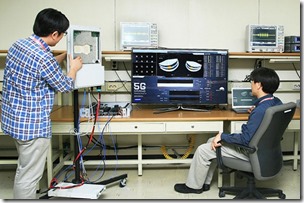Samsung today announced that it has successfully developed the world’s first breakthrough to offer 5G mobile broadband, that will supprt tens of Gbps of data transmission on mobile devices.
The new technology sits at the core of 5G mobile communications system and will provide data transmission up to several hundred times faster than current 4G networks.
5G mobile communications technology is the next generation of the existing 4G Long Term Evolution (LTE) network technology. 5G will be capable of providing a  ubiquitous Gbps experience to subscribers anywhere and offers data transmission speeds of up to several tens of Gbps per base station.
ubiquitous Gbps experience to subscribers anywhere and offers data transmission speeds of up to several tens of Gbps per base station.
 ubiquitous Gbps experience to subscribers anywhere and offers data transmission speeds of up to several tens of Gbps per base station.
ubiquitous Gbps experience to subscribers anywhere and offers data transmission speeds of up to several tens of Gbps per base station.
Samsung plans to accelerate the research and development of 5G mobile communications technologies, includingadaptive array transceiver at the millimeter-wave bands, to commercialize those technologies by 2020.
Samsung said that its latest innovation is expected to invigorate research into 5G cellular communications across the world; the company believes it will trigger the creation of international alliances and the timely commercialization of related mobile broadband services.
Once commercialized, 5G mobile communications technology will be capable of ultra-high-speed data transmission up to several hundred times faster than even the 4G LTE-Advanced technology due for launch later this year.
Samsung’s new technology will allow users to transmit massive data files including high quality digital movies practically without limitation. As a result, subscribers will be able to enjoy a wide range of services such as 3D movies and games, real-time streaming of ultra high-definition (UHD) content, and remote medical services.
Here are some facts about 5G:
- 5G mobile communication technology is the true successor to 4G Long Term Evolution (LTE) network technology
- 5G will be several hundred times faster than the current 4G LTE services, which operate at approximately 75 Mbps per second.
- Once commercialized, 5G will remove obstacles that prevent large-volume contents from being transmitted to smart devices, opening up the possibility of ultra high-definition (UHD), 3D and holographic video content delivery.
- LTE Advanced, an upgrade of the existing 4G LTE technology is due for commercial deployment in Korea in 2013 and will provide services at 150 Mbps, twice as fast as 4G LTE. In contrast, 5G is expected to be several hundred times faster than LTE Advanced as it operates at a much wider bandwidth, akin to letting traffic flow from a single lane to a full expressway
- 5G requires the use of higher radio frequencies compared to existing 4G LTE services. 4G LTE networks typically operate around the 2 GHz frequency range. The developed 5G technology operates at 28 GHz, known as the millimeter-wave Ka band where the wavelengths are much shorter. (see Figure 1 below)
- Commercial deployment of 5G technology is expected around 2020.

0 comments:
Post a Comment